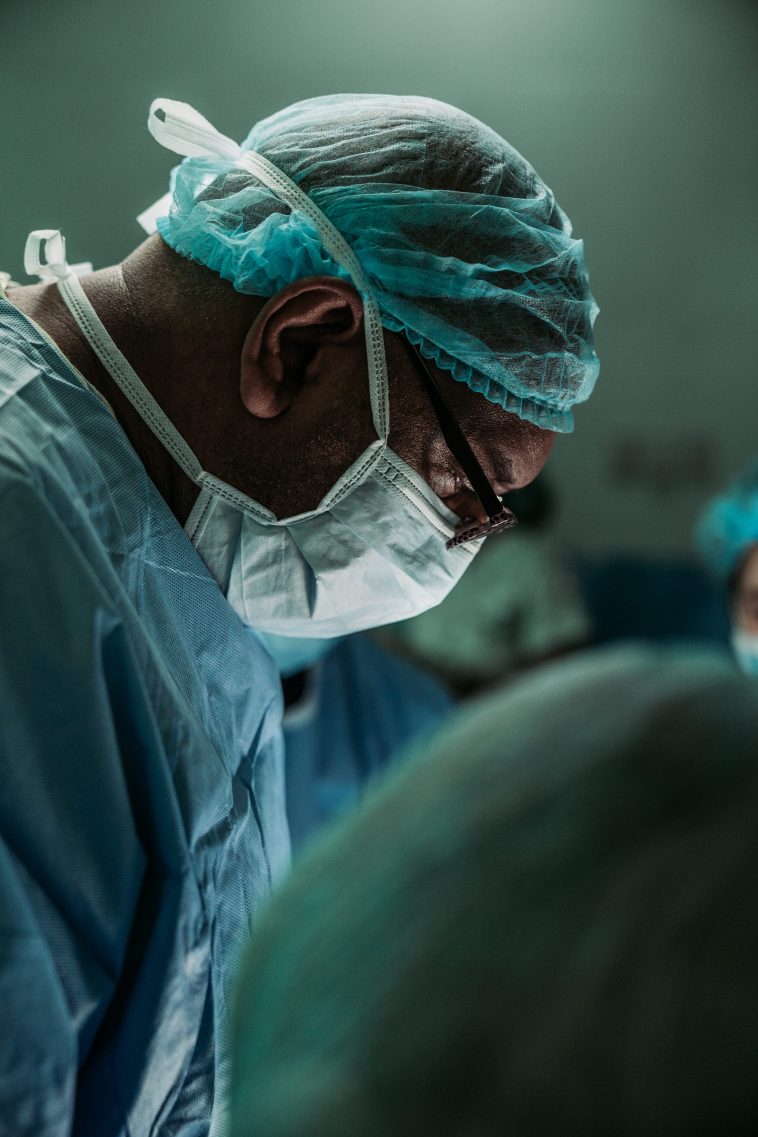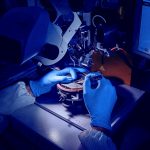n Tobi’s last year as a medical student, he persuaded his university to make a learning management system for anatomy classes, which were very dull. Now, he’s using AI to help African doctors access their medical information faster.
Nigeria, which has the most people in Africa, needs 363,000 doctors to cover everyone’s health care. But there are only 24,000 registered doctors in Nigeria. In 2017, Nigeria had 35,000 doctors, even though the country needed 237,000 doctors to meet the World Health Organization’s (WHO) approved doctor-to-patient ratio.
Even though the population will grow by 2.4% on average between 2017 and 2021, the number of trained doctors has dropped by 31.4%.
Because of this, too few doctors see too many people. Doctors in Nigeria often say they are burned out and “overworked and underpaid.” In most of Africa, the story is the same. The WHO says there are 1.55 health workers (doctors, nurses, and midwives) for every 1,000 people in Africa, with about 3.6 million health workers in 47 countries.
The suggested number of workers is 4.45 for every 1,000 patients. By 2018, only Mauritius, Namibia, Seychelles, and South Africa had more health workers than the WHO recommends per 100,000 people.
Digitizing healthcare
At the beginning of the 1960s, the Mayo Clinic in Rochester, Minnesota, was one of the first big hospitals to use an electronic health record (EHR) system. It cost a lot and wasn’t very good. It could only be used to set up appointments and charge customers.
It was expensive but straightforward and could only be used to schedule and bill patients. Since then, electronic health record software has become much more complex, making it possible to collect and handle much more information about a patient’s health.
Even though their benefits have been discussed, EHRs are not widely used in African health care. Costs are high for installing EHR systems and teaching healthcare workers how to use them. It is also often blamed for the fact that hospitals don’t use EHR tools.
There are also more subtle reasons. Tobi Olatunji is a doctor who went to the University of Ibadan and is now a computer scientist. He says that even in hospitals with EHR systems, doctors don’t always use them because they are hard to use and take a lot of time. Doctors may know how to use computers, but “when you put a keyboard in front of people, you’re making a whole new problem.”
So, Olatunji helped start Intron Health, which uses automatic speech recognition (ASR) technology to record doctors’ notes as they talk. But speech-to-text software wasn’t Intron Health’s first product. When it started in 2019, Intron Health gave hospitals a regular EHR software solution to help them digitize their processes.
In 2020, as COVID-19 spread worldwide and healthcare workers worried that Africa’s weak healthcare system could easily be swamped, Intron Health tested its first software in a Nigerian hospital.
The hospital was busy, and everyone was happy. They had power and a wireless network that we set up for them. Olatunji says, “Everything was great.” “But on the day we started, it took the doctor 40 minutes just to type up the notes for the first patient.”
It took 50 minutes to see the next patient; by then, people in the waiting room could see they were getting angry. If a doctor can’t see a patient because they have to use clunky computer software to make or update their medical data, the patient might look for help somewhere else.
The hospitals that used Intron Health’s early software asked if it could be made more accessible if buttons were used instead of text boxes. But that was a simple answer, and to make a checkbox system that was strong enough, you had to think of every possible medical situation. That couldn’t happen.
Olatunji had a similar experience as a medical student at University College Hospital (UCH) Ibadan. During an anatomy class, a teacher tried to explain how babies move through the birth canal using only pictures from a book and hand gestures. He thought a video lesson would be better because students could watch it as often as possible.
He convinced the university to build a basic learning management system with online animated video lessons, using money from the US National Institutes of Health (NIH) and the World Bank. From then on, Olatunji’s path moved away from being a doctor. His university asked him to help train staff from other universities. When he finished, the university hired him to build technology tools, such as telesurgery tools, a patient navigation app, and clinical simulation software.
Olatunji went to the United States after graduating from UCH Ibadan. He got a master’s degree in medical informatics from the University of San Francisco and another in computer science from Georgia Tech. He worked as a machine learning scientist and researcher for Enlitic, a company in the San Francisco Bay Area. His job was to help build natural language processing (NLP) and natural language understanding (NLU) AI models that could help translate English text into other languages.
AI models for natural language understanding (NLU) can help translate English text into other languages. After he left Enlitic, he became a machine learning scientist on the Health AI team at Amazon Web Services. He was already making software to digitize hospital data in Africa, which later became Intron Health. But something went wrong at his first race.
When doctors in Africa saw too many patients, they couldn’t type fast enough for a digital medical record system to be worth it.
Keyboard to microphones
Intron Health tested popular speech-to-text platforms and found what was apparent. They got the idea from Olatunji’s wife, a doctor who used speech-to-text software. They all got the pronunciations and names of people with African accents wrong. “I used them myself, and we discovered they weren’t made for our voices. “Doctors would waste too much time if they used them,” Olatunji says.
But he had worked on these problems, so the Intron team decided to build a proprietary speech recognition platform and embed it in EHR platforms to make taking notes easier and free up valuable time for the doctors.
It was 2021, and the Intron group worked hard to find audio datasets with an African accent. Intron has collected over 11 million voice samples from 7,000 people in 13 countries with more than 200 accents. It lets them make automatic speech recognition software that can translate foreign speech more accurately than, for example, Google Assistant, Siri, or Alexa.
When a hospital joins Intron’s platform, healthcare workers are asked to read a 74-word passage. “Most people take up to 55 seconds to dictate this, and speech speed is pretty constant,” Olatunji says. But it could take a doctor up to 5 minutes to type the exact text because they must type each letter individually.
When a hospital joins Intron’s platform, healthcare workers are asked to read a 74-word passage. “Most people take up to 55 seconds to dictate this, and speech speed is pretty constant,” Olatunji says. But it could take a doctor up to 5 minutes to type the exact text because they must type each letter individually.
Doctors can take notes faster and save time with speech recognition technology that can understand African accents. Olatunji says that speech-to-text software from Intron is now being used in hospitals in Nigeria, Kenya, Ghana, and South Africa.
One of the hospitals employing Intron Health’s software is Meridian Health Group in Nairobi, where Dr. Nakunta Muwasu practices medicine. It speeds up taking brief notes, says Muwasu, speaking to TechCabal. However, she prefers to type on her keyboard for longer records.
Intron has written many papers that are now being reviewed, which it plans to present at academic computer science conferences to highlight its work. Tobi Olatunji, Tejumade Afonja, and five other computer scientists demonstrate how their African-accent model surpasses the more well-known speech recognition software models in one of their articles.
Intron is an African enterprise that employs artificial intelligence to facilitate digital transformation. InstaDeep, a 2015-founded Tunisian enterprise AI company that raised $107 million from investors, was acquired by BioNTech earlier this year for $680 million.
Intron, on the other hand, has only gathered $250,000 from family and friends since its start in 2019. Even so, it has built and kept up the expensive infrastructure needed to run an AI company, thanks in part to a relationship with Nvidia, which makes GPU chips.
As part of the same relationship, the company is holding a hackathon with a $5,000 prize where programmers can use a small part of its training dataset to build better models. Afri-Speech-200, the development challenge, was made in collaboration with DSN, Masakhane, and Zindi to help artificial intelligence become more diverse.
One problem that AI experts and people in charge of regulating technology have had to deal with is the lack of variety and the chance of bias. Intron’s ASR technology could be a useful tool for healthcare workers in Africa, but it also shows how much work needs to be done to make sure that AI systems are not totally blind to situations outside of developed countries where training data is abundant.



